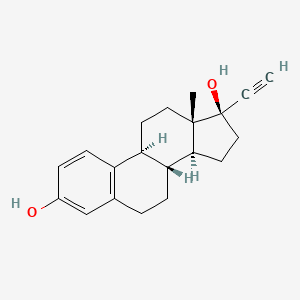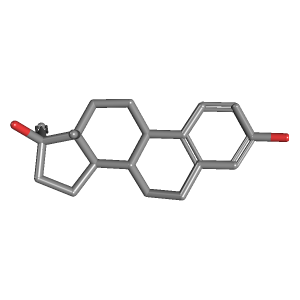Ethinyl Estradiol Information
Click here to view all Ethinyl Estradiol productsThe information, including but not limited to, text, graphics, images and other material contained on this website are for informational purposes only. No material on this site is intended to be a substitute for the consultation, diagnosis, and/or medical treatment of a qualified physician or healthcare provider.


Ethinyl estradiol is a synthetic form of the hormone estrogen. It is commonly used in combination with a progestin hormone in various forms of hormonal contraception, such as birth control pills, patches, and vaginal rings.
Ethinyl estradiol works by preventing ovulation, which is the release of an egg from the ovary. It also thickens the cervical mucus, making it more difficult for sperm to reach the egg. Additionally, it alters the lining of the uterus, making it less receptive to the implantation of a fertilized egg.
By inhibiting ovulation and altering the reproductive environment, ethinyl estradiol helps to prevent pregnancy. It is important to note that ethinyl estradiol does not protect against sexually transmitted infections (STIs) and should not be used as a sole method of protection against STIs.
Synonyms of Ethinyl Estradiol
- ethinyl estradiol
- Ethynylestradiol
- 57-63-6
- Ethynyl estradiol
- ETHINYLESTRADIOL
- Ethinyloestradiol
- 17-Ethinylestradiol
- Estinyl
- 17alpha-Ethynylestradiol
- Ginestrene
- Lynoral
- Progynon C
- Ethinoral
- Eticyclin
- Eticyclol
- Etinestrol
- Etinestryl
- Etinoestryl
- Etistradiol
- Follicoral
- Novestrol
- Orestralyn
- Spanestrin
- Amenoron
- Dyloform
- Ertonyl
- Estigyn
- Estoral
- Estorals
- Ethidol
- Feminone
- Inestra
- Linoral
- Menolyn
- Oradiol
- Primogyn
- Esteed
- Neo-Estrone
- Primogyn C
- Primogyn M
- Nogest-S
- Eston-E
- Palonyl
- Perovex
- 17alpha-Ethinylestradiol
- 17-Ethynylestradiol
- Diogyn E
- Microfollin
- Chee-O-Genf
- Chee-O-Gen
- 17-Ethinyl-3,17-estradiol
- Ethynyloestradiol
- 17-Ethinyl-3,17-oestradiol
- 17-Ethynyloestradiol
- Estoral (Orion)
- 17alpha-Ethinyl estradiol
- Amenorone
- Diprol
- Ethinyl-oestranol
- Diognat-E
- Diogyn-E
- Aethinyloestradiolum
- Estopherol
- Eticylol
- Orestrayln
- Prosexol
- Ylestrol
- Anovlar
- Etivex
- 17a-Ethynylestradiol
- Ortho-Cyclen
- Progynon M
- Ethinylestradiolum
- Ethinyl E2
- Estradiol, 17-ethynyl-
- Estoral (VAN)
- Aethinyoestradiol [German]
- Etinilestradiol
- NSC-10973
- Certostat
- Etinilestradiolo
- Aethinyoestradiol
- Microfollin Forte
- Etinilestradiol [INN-Spanish]
- EE(sub 2)
- Etinilestradiolo [DCIT]
- 17alpha-Ethynyloestradiol
- Ethinylestradiolum [INN-Latin]
- 17-alpha-Ethynylestradiol
- Ethinyl Estradiol [USP]
- 17alpha-Ethinylestradiol-17beta
- Ethinylestradiol [INN:BAN:JAN]
- 17-alpha-Ethynylestradiol-17-beta
- 17.alpha.-Ethinylestradiol
- 17.alpha.-Ethynylestradiol
- Estoral [Orion]
- 17-alpha-Ethinyl-17-beta-estradiol
- 17.alpha.-Ethynyloestradiol
- 17-alpha-Ethynyl-17-beta-oestradiol
- component of Oracon
- component of Ortrel
- CCRIS 286
- Estinyl (TN)
- component of Demulen
- 17a-Ethinylestradiol
- HSDB 3587
- 17 alpha-ethinyestradiol
- Ethinyl estradiol (USP)
- EINECS 200-342-2
- EE
- CHEMBL691
- OVULEN-21
- OVULEN-28
- 17-alpha-ethynyl estradiol
- 17.alpha.-Ethinyl-17.beta.-estradiol
- BRN 2419975
- Ethinyloestradiol [Steroidal oestrogens]
- 17.alpha.-Ethynyl-17.beta.-oestradiol
- AI3-52941
- MLS000028479
- CHEBI:4903
- (8R,9S,13S,14S,17R)-17-ethynyl-13-methyl-7,8,9,11,12,13,14,15,16,17-decahydro-6H-cyclopenta[a]phenanthrene-3,17-diol
- EE2
- EO
- DTXSID5020576
- UNII-423D2T571U
- 19-Nor-17alpha-pregna-1,3,5(10)-trien-20-yne-3,17-diol
- 17alpha-Ethinyl-17beta-estradiol
- 17-Ethynyl-3,17-dihydroxy-1,3,5-oestratriene
- 19-Norpregna-1,3,5(10)-trien-20-yne-3,17-diol, (17alpha)-
- 17.alpha.-Ethynylestradiol-l7.beta.
- 17-alpha-Ethynyl-1,3,5-oestratriene-3,17-beta-diol
- 423D2T571U
- (8R,9S,13S,14S,17R)-17-ethynyl-13-methyl-7,8,9,11,12,14,15,16-octahydro-6H-cyclopenta[a]phenanthrene-3,17-diol
- 17.alpha.-Ethynyloestradiol-17.beta.
- 17alpha-ethinylestra-1,3,5(10)-triene-3,17beta-diol
- 17alpha-ethinyloestra-1,3,5(10)-triene-3,17beta-diol
- PUBERTAL ETHINYL ESTRADIOL STUDY
- 17-alpha-Ethinylestra-1,3,5(10)-triene-3,17-beta-diol
- 17-alpha-Ethynyl-1,3,5(10)-estratriene-3,17-beta-diol
- ethinylestradiol betadex
- NCGC00091533-04
- 17-alpha-Ethinyloestra-1,3,5(10)-triene-3,17-beta-diol
- 17-alpha-Ethynyl-1,3,5(10)-oestratriene-3,17-beta-diol
- 17alpha-Ethinyl-3,17-dihydroxy-delta(sup1,3,5)-estratriene
- 17alpha-ethinyl-3,17-dihydroxy-delta(sup1,3,5)oestratriene
- 3,17beta-Dihydroxy-17alpha-ethynyl-1,3,5(10)-estratriene
- 3,17beta-Dihydroxy-17alpha-ethynyl-1,3,5(10)-oestratriene
- Estra-1,3,5(10)-triene-3,17beta-diol, 17alpha-ethynyl-
- SMR000058319
- 17-alpha-Ethinyl-3,17-dihydroxy-delta(sup 1,3,5)-estratriene
- 19-Norpregna-1,3,5(10)-trien-20-yne-3,17-diol, (17a)-
- 3,17-beta-Dihydroxy-17-alpha-ethynyl-1,3,5(10)-estratriene
- 3,17-beta-Dihydroxy-17-alpha-ethynyl-1,3,5(10)-oestratriene
- Estra-1,3,5(10)-triene-3,17-beta-diol, 17-alpha-ethynyl-
- (17-alpha)-19-Norpregna-1,3,5(10)-trien-20-yne-3,17,diol
- 17alpha-ethinyl-delta(sup1,3,5(10))oestratriene-3,17-beta -diol
- 17alpha-Ethynyloestradiol-17beta; 17beta-Estradiol, 17-ethynyl-
- 19-Nor-17-alpha-pregna-1,3,5(10)-triene-20-yne-3,17-diol
- 17-alpha-Ethinyl-delta(sup 1,3,5(10))oestratriene-3,17-beta-diol
- 19-Norpregna-1,3,5(10)-trien-20-yne-3,17-diol, (17.alpha.)-
- DTXCID70576
- 17alpha-Ethynylestra-1,3,5(10)-triene-3,17beta-diol
- (17beta)-17-ethynylestra-1(10),2,4-triene-3,17-diol
- 17alpha-ethinyl-estra-1,3,5(10)-triene-3,17beta-diol
- Dicromil
- (17alpha)-19-norpregna-1,3,5(10)-trien-20-yne-3,17-diol
- 19-Nor-17-alpha-pregna-1,3,5(10)-trien-20-yne-3,17-diol
- CAS-57-63-6
- Estradiol, Ethinyl
- Estradiol, Ethynyl
- Ethy 11
- Ethinyl Oestradiol Effik
- Ethinyl-Oestradiol Effik
- Ethinylestradiol Jenapharm
- MFCD00003690
- 17 alpha-Ethinylestradiol
- 17 alpha-Ethynylestradiol
- Jenapharm, Ethinylestradiol
- 17 alpha-Ethynyloestradiol
- Estra-1,5(10)-triene-3,17.beta.-diol, 17-ethynyl-
- Estra-1,5[10]-triene-3,17.beta.-diol, 17-ethynyl-
- Ethinyl Estradiol Hemihydrate
- Gynofen
- Novinet
- Ylestol
- 19-Nor-17.alpha.-pregna-1,5(10)-trien-20-yne-3,17-diol
- 19-Nor-17.alpha.-pregna-1,5[10]-trien-20-yne-3,17-diol
- Hemihydrate, Ethinyl Estradiol
- ethinyl-estradiol
- ethinylestradiol-
- Certostat\r\n
- Acetylene estradiol
- component of Ovral
- 17-etinilestradiol
- 3WF
- Levlen (Salt/Mix)
- Oracon (Salt/Mix)
- Ortrel (Salt/Mix)
- Ethinyl Estradiol, (8 alpha)-Isomer
- Anovlar (Salt/Mix)
- Desogen (Salt/Mix)
- 17a-Ethynyloestradiol
- Estoral {[Orion]}
- Nordette (Salt/Mix)
- Secrovin (Salt/Mix)
- Seasonale (Salt/Mix)
- Triphasil (Salt/Mix)
- Estopherol (Salt/Mix)
- Estradiol 17-ethynyl-
- Seasonique (Salt/Mix)
- 17-Ethynylestradiol ram
- Ortho Evra (Salt/Mix)
- Tri-Levlen (Salt/Mix)
- Opera_ID_1808
- 17 alpha Ethynylestradiol
- 17a-Ethynylestradiol-l7b
- Ortho-Cyclen (Salt/Mix)
- D06NXY
- 17a-Ethynyloestradiol-17b
- SCHEMBL4071
- 17-Ethinyl-317-estradiol
- 17a-Ethinyl-17b-estradiol
- 17-etinil-3,17-estradiol
- 17a-Ethynyl-17b-oestradiol
- MLS000758274
- MLS001424011
- 17-Ethinyl-3 17-estradiol
- BIDD:ER0162
- ETHINYLESTRADIOL [INN]
- ETHINYLESTRADIOL [JAN]
- ETHINYL ESTRADIOL [MI]
- Ethinylestradiol (JP15/INN)
- Ethinylestradiol (JP17/INN)
- ETHINYLESTRADIOL [INCI]
- GTPL7071
- SGCUT00127
- 17alpha-Ethynyl-1,3,5(10)-estratriene-3,17beta-diol
- ETHINYL ESTRADIOL [HSDB]
- ETHINYLESTRADIOL [MART.]
- 17alpha-Ethynylestradiol (EE2)
- Effik Brand of Ethinyl Estradiol
- 17alpha-Ethynyloestradiol-17beta
- ETHINYL ESTRADIOL [VANDF]
- ETHINYLESTRADIOL [WHO-DD]
- ETHINYLESTRADIOL [WHO-IP]
- HMS2051I19
- HMS2235J09
- HMS3715J09
- 17-alpha-Ethynylestradiol-l7-beta
- 17alpha-Ethynylestradiol, >=98%
- ETHINYL ESTRADIOL [USP-RS]
- Ethynylestradiol, Ethinyl Estradiol
- Organon Brand of Ethinyl Estradiol
- 17.beta.-Estradiol, 17-ethynyl-
- HY-B0216
- NSC10973
- Schering Brand of Ethinyl Estradiol
- to_000048
- 17-alpha-Ethynyloestradiol-17-beta
- 17-Ethynylestradiol;Ethynylestradiol
- Tox21_111147
- Tox21_201291
- Tox21_300413
- 17alpha-Ethynylestra-3 17beta-diol
- BDBM50187243
- ETHINYL ESTRADIOL [EMA EPAR]
- Jenapharm Brand of Ethinyl Estradiol
- LMST02010036
- LS-231
- NSC 10973
- s1625
- 17|A-Ethynylestradiol;Ethynylestradiol
- AKOS015894925
- Tox21_111147_1
- YAZ COMPONENT ETHINYL ESTRADIOL
- AC-2169
- CCG-100819
- DB00977
- ETHINYL ESTRADIOL [ORANGE BOOK]
- ETHINYLESTRADIOL [EP MONOGRAPH]
- KS-5257
- NC00069
- 17.alpha.-ethinyl-3,3,5)oestratriene
- BEYAZ COMPONENT ETHINYL ESTRADIOL
- OVRAL COMPONENT ETHINYL ESTRADIOL
- ZOVIA COMPONENT ETHINYL ESTRADIOL
- 17.alpha.-Ethinyl-3,3,5)-estratriene
- ALESSE COMPONENT ETHINYL ESTRADIOL
- AVIANE COMPONENT ETHINYL ESTRADIOL
- ETHINYL ESTRADIOL [USP MONOGRAPH]
- ETHINYLESTRADIOLUM [WHO-IP LATIN]
- FEMHRT COMPONENT ETHINYL ESTRADIOL
- KARIVA COMPONENT ETHINYL ESTRADIOL
- KELNOR COMPONENT ETHINYL ESTRADIOL
- LEVORA COMPONENT ETHINYL ESTRADIOL
- LYBREL COMPONENT ETHINYL ESTRADIOL
- NCGC00091533-01
- NCGC00091533-05
- NCGC00091533-07
- NCGC00091533-08
- NCGC00091533-09
- NCGC00091533-10
- NCGC00254514-01
- NCGC00258843-01
- PORTIA COMPONENT ETHINYL ESTRADIOL
- PREVEN COMPONENT ETHINYL ESTRADIOL
- TWIRLA COMPONENT ETHINYL ESTRADIOL
- VIENVA COMPONENT ETHINYL ESTRADIOL
- VOLNEA COMPONENT ETHINYL ESTRADIOL
- XULANE COMPONENT ETHINYL ESTRADIOL
- YASMIN COMPONENT ETHINYL ESTRADIOL
- BEKYREE COMPONENT ETHINYL ESTRADIOL
- DESOGEN COMPONENT ETHINYL ESTRADIOL
- ENSKYCE COMPONENT ETHINYL ESTRADIOL
- ETHINYL ESTRADIOL COMPONENT OF YAZ
- KURVELO COMPONENT ETHINYL ESTRADIOL
- LESSINA COMPONENT ETHINYL ESTRADIOL
- LEVLITE COMPONENT ETHINYL ESTRADIOL
- NCI60_000234
- NORINYL COMPONENT ETHINYL ESTRADIOL
- PIMTREA COMPONENT ETHINYL ESTRADIOL
- SAFYRAL COMPONENT ETHINYL ESTRADIOL
- TRIVORA COMPONENT ETHINYL ESTRADIOL
- VELIVET COMPONENT ETHINYL ESTRADIOL
- VIORELE COMPONENT ETHINYL ESTRADIOL
- VYFEMLA COMPONENT ETHINYL ESTRADIOL
- ALTAVERA COMPONENT ETHINYL ESTRADIOL
- ANNOVERA COMPONENT ETHINYL ESTRADIOL
- ARANELLE COMPONENT ETHINYL ESTRADIOL
- BREVICON COMPONENT ETHINYL ESTRADIOL
- CRYSELLE COMPONENT ETHINYL ESTRADIOL
- CYCLESSA COMPONENT ETHINYL ESTRADIOL
- ELIFEMME COMPONENT ETHINYL ESTRADIOL
- ENPRESSE COMPONENT ETHINYL ESTRADIOL
- ISIBLOOM COMPONENT ETHINYL ESTRADIOL
- LEVONEST COMPONENT ETHINYL ESTRADIOL
- MARLISSA COMPONENT ETHINYL ESTRADIOL
- MIRCETTE COMPONENT ETHINYL ESTRADIOL
- NORDETTE COMPONENT ETHINYL ESTRADIOL
- NUVARING COMPONENT ETHINYL ESTRADIOL
- ORSYTHIA COMPONENT ETHINYL ESTRADIOL
- PREVIFEM COMPONENT ETHINYL ESTRADIOL
- QUASENSE COMPONENT ETHINYL ESTRADIOL
- SETLAKIN COMPONENT ETHINYL ESTRADIOL
- SPRINTEC COMPONENT ETHINYL ESTRADIOL
- TAYTULLA COMPONENT ETHINYL ESTRADIOL
- ETHINYL ESTRADIOL COMPONENT OF BEYAZ
- ETHINYL ESTRADIOL COMPONENT OF OVRAL
- INTROVALE COMPONENT ETHINYL ESTRADIOL
- QUARTETTE COMPONENT ETHINYL ESTRADIOL
- SEASONALE COMPONENT ETHINYL ESTRADIOL
- TRIPHASIL COMPONENT ETHINYL ESTRADIOL
- ETHINYL ESTRADIOL COMPONENT OF ALESSE
- ETHINYL ESTRADIOL COMPONENT OF DESOGEN
- ETHINYL ESTRADIOL COMPONENT OF FEMHRT
- ETHINYL ESTRADIOL COMPONENT OF KARIVA
- ETHINYL ESTRADIOL COMPONENT OF KELNOR
- ETHINYL ESTRADIOL COMPONENT OF LEVLITE
- ETHINYL ESTRADIOL COMPONENT OF LYBREL
- ETHINYL ESTRADIOL COMPONENT OF PREVEN
- ETHINYL ESTRADIOL COMPONENT OF SAFYRAL
- ETHINYL ESTRADIOL COMPONENT OF TWIRLA
- ETHINYL ESTRADIOL COMPONENT OF VELIVET
- ETHINYL ESTRADIOL COMPONENT OF YASMIN
- FEMCON FE COMPONENT ETHINYL ESTRADIOL
- ORTHO-CEPT COMPONENT ETHINYL ESTRADIOL
- SEASONIQUE COMPONENT ETHINYL ESTRADIOL
- 17-Ethynyl-3-17-dihydroxy-1,5-oestratriene
- 17alpha-Ethynylestradiol, >=98.0% (HPLC)
- ETHINYL ESTRADIOL COMPONENT OF ALTAVERA
- ETHINYL ESTRADIOL COMPONENT OF ANNOVERA
- ETHINYL ESTRADIOL COMPONENT OF ARANELLE
- ETHINYL ESTRADIOL COMPONENT OF CRYSELLE
- ETHINYL ESTRADIOL COMPONENT OF CYCLESSA
- ETHINYL ESTRADIOL COMPONENT OF LEVONEST
- ETHINYL ESTRADIOL COMPONENT OF MIRCETTE
- ETHINYL ESTRADIOL COMPONENT OF NUVARING
- ETHINYL ESTRADIOL COMPONENT OF PREVIFEM
- ETHINYL ESTRADIOL COMPONENT OF QUASENSE
- ETHINYL ESTRADIOL COMPONENT OF SETLAKIN
- ETHINYL ESTRADIOL COMPONENT OF SPRINTEC
- NORQUEST FE COMPONENT ETHINYL ESTRADIOL
- C07534
- D00554
- EN300-119516
- ESTROSTEP FE COMPONENT ETHINYL ESTRADIOL
- ETHINYL ESTRADIOL COMPONENT OF FEMCON FE
- ETHINYL ESTRADIOL COMPONENT OF INTROVALE
- ETHINYL ESTRADIOL COMPONENT OF SEASONALE
- H11762
- LOSEASONIQUE COMPONENT ETHINYL ESTRADIOL
- TRI-PREVIFEM COMPONENT ETHINYL ESTRADIOL
- TRI-SPRINTEC COMPONENT ETHINYL ESTRADIOL
- 17-Ethynyl-3 17-dihydroxy-1 3 5-oestratriene
- 17-Ethynyl-3-17-dihydroxy-1,3,5-oestratriene
- 17-etinil-3,17-dihidroxi-1,3,5-oestratriene
- AB00441335-11
- AB00441335_12
- ETHINYL ESTRADIOL COMPONENT OF ORTHO-CEPT
- ETHINYL ESTRADIOL COMPONENT OF SEASONIQUE
- TRI-LEGEST FE COMPONENT ETHINYL ESTRADIOL
- WLN: L E5 B666TTT&J E1 FQ F1UU1 OQ
- ETHINYL ESTRADIOL COMPONENT OF ESTROSTEP FE
- ETHINYL ESTRADIOL COMPONENT OF LOSEASONIQUE
- ETHINYL ESTRADIOL COMPONENT OF NORQUEST FE
- ETHINYL ESTRADIOL COMPONENT OF TRI-PREVIFEM
- ETHINYL ESTRADIOL COMPONENT OF TRI-SPRINTEC
- LO LOESTRIN FE COMPONENT ETHINYL ESTRADIOL
- LO MINASTRIN FE COMPONENT ETHINYL ESTRADIOL
- Q415563
- SR-01000721903
- TRI LO SPRINTEC COMPONENT ETHINYL ESTRADIOL
- 17-Ethynylestra-1 3 5(10)-triene-3 17beta-diol
- 17-Ethynylestra-1,3,5(10)-triene-3,17beta-diol
- 17a-Ethinylestradiol 100 microg/mL in Acetonitrile
- ETHINYL ESTRADIOL COMPONENT OF LO LOESTRIN FE
- ETHINYL ESTRADIOL COMPONENT OF TRI-LEGEST FE
- MINASTRIN 24 FE COMPONENT ETHINYL ESTRADIOL
- ORTHO TRI-CYCLEN COMPONENT ETHINYL ESTRADIOL
- Q-201076
- SR-01000721903-3
- 17-Ethynyloestra-1,5(10)-triene-3,17.beta.-diol
- 17.alpha.-Ethynyl-1,5-estratriene-3,17.beta.-diol
- 17.alpha.-Ethynyl-1,5-oestratriene-3,17.beta.-diol
- 17alpha-Ethinyl-1 3 5(10)-estratriene-3 17-diol
- 17alpha-Ethinyl-1,3,5(10)-estratriene-3,17-diol
- BRD-K48195008-001-19-9
- ETHINYL ESTRADIOL COMPONENT OF ORTHO TRI-CYCLEN
- ETHINYL ESTRADIOL COMPONENT OF TRI LO SPRINTEC
- TRANSGENIC MODEL EVALUATION (ETHINYL ESTRADIOL)
- 17-Ethynyloestra-1,3,5(10)-triene-3,17.beta.-diol
- 17.alpha.-Ethinyl-1,3,5(10)-estratriene-3,17-diol
- 17alpha-Ethinylestra-1 3 5(10)-triene-3 17beta-diol
- 17alpha-Ethynylestra-1 3 5(10)-triene-3 17beta-diol
- Z1521553721
- (17beta)-17-ethynylestra-1,3,5(10)-triene-3,17-diol
- 17.alpha.-ethinylestra-1,5(10)-triene-3,17.beta.-diol
- 17.alpha.-ethinyloestra-1,5(10)-triene-3,17.beta.-diol
- 17.alpha.-Ethynylestra-1,5(10)-triene-3,17.beta.-diol
- 17.alpha.-Ethynyloestra-1,5(10)-triene-3,17.beta.-diol
- 17alpha-Ethinyl-3 17-dihydroxy-Delta 1 3 5-estratriene
- 17.alpha.-ethinylestra-1,3,5(10)-triene-3,17.beta.-diol
- 17.alpha.-ethinyloestra-1,3,5(10)-triene-3,17.beta.-diol
- 17.alpha.-Ethynyl-1,3,5(10)-estratriene-3,17.beta.-diol
- 17.alpha.-Ethynyl-1,3,5(10)-oestratriene-3,17.beta.-diol
- 17.alpha.-Ethynylestra-1,3,5(10)-triene-3,17.beta.-diol
- 17.alpha.-Ethynyloestra-1,3,5(10)-triene-3,17.beta.-diol
- 17alpha-Ethynylestradiol, VETRANAL(TM), analytical standard
- 19-nor-17.alpha.-Pregna-1,5(10)-trien-2-yne-3,17-diol
- Estra-1,5(10)-triene-3,17.beta.-diol, 17.alpha.-ethynyl-
- 17-Nor-17alpha-pregna-1 3 5-(10)-trien-20-yne-3 17-diol
- 17.alpha.-Ethinyl-3,17-dihydroxy-.delta.(sup1,3,5)-estratriene
- 17.alpha.-ethinyl-3,17-dihydroxy-.delta.(sup1,3,5)oestratriene
- 19-Nor-17.alpha.-pregna-1,3,5 (10)-trien-20-ino-3,17-diol
- 19-Nor-17.alpha.-pregna-1,3,5(10)-trien-20-yn-3,17-diol
- 19-Nor-17.alpha.-pregna-1,3,5(10)-trien-20-yne-3,17-diol
- 19-Nor-17alpha-pregna-1 3 5(10)-trien-20-yne-3 17beta-diol
- 19-Norpregna-1, 3,5 (10)-trien-20-ino-3,17-diol, (17alfa)-
- 19-Norpregna-1,5(10)-trien-20-yne-3,17-diol, (17.alpha.)-
- 3,17.beta.-Dihydroxy-17.alpha.-ethynyl-1,3,5(10)-estratriene
- 3,17.beta.-Dihydroxy-17.alpha.-ethynyl-1,3,5(10)-oestratriene
- Estra-1,3,5(10)-triene-3,17.beta.-diol, 17.alpha.-ethynyl-
- Ethinylestradiol, European Pharmacopoeia (EP) Reference Standard
- 17.alpha.-ethinyl-.delta.(sup1,3,5(10))oestratriene-3,17-.beta. -diol
- 17.alpha.-ethinyl-.delta.(sup1,5(10))oestratriene-3,17-.beta.-diol
- 19-Nor-17.alpha.-pregna-1,3,5(10)-trien-20-yne-3,17.beta.-diol
- 19-Nor-17alpha-pregna-135(10)-trien-20-yne-317-diol (6CI7CI8CI)
- Ethinyl estradiol, United States Pharmacopeia (USP) Reference Standard
- ENDOCRINE DISRUPTOR (ETHINYL ESTRADIOL) (SEE ALSO ETHINYL ESTRADIOL (57-63-6))
- Ethinyl Estradiol, Pharmaceutical Secondary Standard; Certified Reference Material
- Ethinylestradiol for system suitability, European Pharmacopoeia (EP) Reference Standard
- (1R,3aS,3bR,9bS,11aS)-1-ethynyl-11a-methyl-1H,2H,3H,3aH,3bH,4H,5H,9bH,10H,11H,11aH-cyclopenta[a]phenanthrene-1,7-diol
- (1S,10R,11S,14R,15S)-14-ethynyl-15-methyltetracyclo[8.7.0.0^{2,7}.0^{11,15}]heptadeca-2(7),3,5-triene-5,14-diol
- 1050678-65-3

